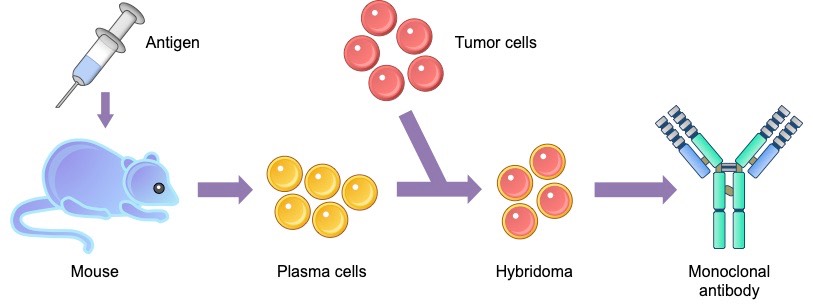Key Knowledge:
|
Immunotherapy involves the treatment of diseases with substances that moderate the body’s normal immune response
- Activation immunotherapies elicit or amplify an immune response while suppression immunotherapies will reduce the response
- Immunotherapy strategies may include the use of non-specific immunomodulators (cytokines) or specific monoclonal antibodies
Monoclonal Antibodies
Monoclonal antibodies are specific antibodies artificially derived from a single B cell clone (mono = one type ; clonal = many copies)
- An animal (typically a mouse) is injected with an antigen in order to produce antigen-specific plasma cells
- The plasma cells are removed and fused (hybridised) with tumor cells capable of endless divisions (i.e. an immortal cell line)
- The resulting hybridoma cell is capable of synthesising large quantities of monoclonal antibody that can then be isolated for use

Cancer Treatment
Cancers are a class of diseases caused by uncontrolled cell division and can occur in any organ or tissue
- The abnormal cell growths (tumours) can remain in place (benign) or spread (malignant) and impact normal homeostatic processes
Because cancer cells are derived from the body’s own tissue (not ‘foreign’), they do not normally trigger a strong immune response
- However, cancer cells will produce novel proteins (called neoantigens) that can be targeted (requires activation immunotherapy)
Monoclonal antibodies can be developed that are specific to these neoantigens and assist in cancer treatment in a variety of ways
- They can bind to the cancer cell and assist in its recognition and destruction by phagocytic leukocytes (i.e. opsonisation)
- They can target and inhibit immune checkpoint regulators on the cancer cell (checkpoint regulators control overall immune activity)
- They can be complexed to chemotherapy agents in order to help the drugs specifically target cancerous tissue
Autoimmune Diseases
Autoimmunity occurs when the immune system fails to recognise body cells as ‘self’ and begins targeting its own cells and tissues
- Some pathogens try to evade immune detection by producing antigens that closely resemble host markers (antigenic mimicry)
- Detection of these pathogens leads to the production of antibodies that recognise and target markers on body cells (cross reactivity)
- Examples of autoimmune diseases include diabetes (type I), rheumatoid arthritis and multiple sclerosis
Monoclonal antibodies treat autoimmune diseases by targeting pro-inflammatory proteins (involves suppression immunotherapy)
- By targeting surface proteins and cytokines involved in triggering an immune response, the effects of autoimmunity can be reduced
- For example, TNF (tumour necrosis factor) is a cytokine that acts as a key mediator for inflammatory-based immune responses
- Using monoclonal antibodies specific to TNF can reduce the inflammation-induced joint damage caused by rheumatoid arthritis
- Autoimmune diseases can also be treated by using monoclonal antibodies that target surface proteins involved in B cell proliferation